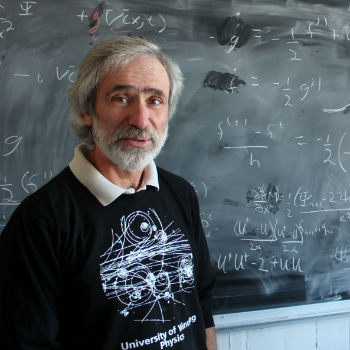
Dr. Gabor Kunstatter,©Isaac Gutwilik
UWinnipeg has an internationally acclaimed referee on its campus. UWinnipeg physicist Dr. Gabor Kunstatter has been given the title of 2019 Outstanding Referee of the Physical Review journals. This is a highly selective award program recognizes scientists who have been exceptional in assessing manuscripts for publication in the American Physical Society (APS).
Kunstatter is among a list of distinguished minds from illustrious universities from across the globe. He is a top researcher in the rarefied scientific specialties who takes time to give pre-publication articles an intellectually thorough critical assessment. Referees must maintain the reputed quality of the published journal articles by submitting all papers to a rigorous peer review process.
Kunstatter has been refereeing for APS, as well as several other journals, for close to forty years.
“I referee because it is a vital part of what theoretical physicists do,” explains Kunstatter. “We are not restricted to the tasks described by Sheldon in the Bang Bang theory, namely thinking and occasionally writing stuff down. We also need to expose our thoughts and writings to scrutiny and criticism by the scientific community. Referees provide a filter (admittedly not a perfect one), that helps scientists separate the signal from the noise in the huge volume of research that is currently produced. I for one would be unable to function without the several excellent refereed journals, such as Physical Review, that we currently have at our disposal.”
Dr. Dwight Vincent, Chair of Physics notes, “Dr. Kunstatter is very prolific in helping out with scientific journal article reviews in his field of quantum gravity, an important branch of theoretical physics. This is of great benefit to physics. His selfless work helps fundamental science progress by the critical assessment of new ideas.”
When Kunstatter is not refereeing or teaching, he is doing research that has produced over 180 publications to his name. The goal of his research is to learn something new and fundamental about how the universe works.
“Gravitation and quantum mechanics are particularly fascinating and beautiful theories that have bizarre consequences, such as the slowing down of time near black holes and spooky ‘action at a distance,'” shared Kunstatter. “The theory that unifies them will undoubtedly be even stranger and more compelling.”
In addition to satisfying our natural curiosity about the world around us, Kunstatter’s research has more practical, albeit long term, implications: Virtually all the modern conveniences that we now enjoy and that fuel the global economy are direct consequences of paradigm shifting basic research that was in the beginning curiosity driven. The technology at the heart of computers relies on quantum mechanics, while GPS would not be possible without knowing the effects of Einstein’s theory of gravity on the motions of satellites. Both these theories were formulated by scientists whose primary goal was to understand the mysteries of the Universe. The technological and economic pay-off of this type of research might take a while to be realized, but when it comes, it is huge!
In 2014, UWinnipeg’s Dr. Andrew Frey also earned this prestigious recognition.




